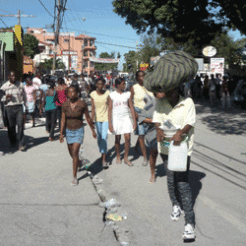The response of charities to expressions of support and donations to Haiti appeals was far from equal. Jonathon Grapsas begins a mystery shopping exercise.
One of the things I'm passionate about in our sector is delivering brilliant levels of supporter care.
In fact much of what I've done over the few years is working with charities to find even better ways to reach out and look after those people who are the lifeblood of what we do: our donors.
You may have seen some earlier posts here about the mystery shopping work we've been conducting in different parts of the world. To understand how charities care for donors, and look at ways to do it even better.
So in the wake of the devastating earthquake in Haiti earlier this year, I got together with my colleagues in Australia and our friends over at Pell & Bales in the UK, and The Fundraising Company in Spain to get a sense of how charities fundraising for Haiti were doing in the wash up.
I'll spend some more time over the coming weeks looking at some of the specific findings from this project, but in a nutshell here's what we did:
• Made an online gift around two weeks after the Haiti disaster. The gift made was for the equivalent of $25 USD, to 52 organisations in the US, Canada, the UK, Australia and Spain.
• Sat back and watched what happened after the donation was made. We monitored the organizations subsequent efforts for the next two months (up till the end of April).
• Analyzed the results, based on five key criteria:
- Initial contact experience. What was the experience like as a donor making the donation? Did the charity actually take our money?
- Response time. Did we hear back from the charity the same day the gift was made online?
- Value of the ‘thank you’. Was it personal? Were we actually thanked ’? Was a story shared? Were we provided with links to up to date information?
- How proactive the organisation was. Was information shared about how our gift would make a difference? Was regular giving promoted initially and throughout the period?
- The follow up. Was there ongoing feedback and updates? Were we asked for subsequent donations, and if so were we asked to consider a regular gift?
So what happened?
For the most part the initial response to our gifts was pretty good. Most responses were speedy, the level of thanking was good (mostly) and in the main our gifts were processed (except for 4 donations we attempted to make in Spain).
Immediately after our gift we began to be communicated with regularly. We were kept abreast of what was happening in the field. Certainly from an operational perspective. Our biggest observation was that there were a real lack of stories being shared, about people, real people, who were actually being helped. We were fed lots about the facts, not much about human stories.
Subsequently we wanted to see how many efforts were made to ask us for another gift/s. And in particular did these organizations each out and ask us for a regular gift? The take up on this was low, which was disappointing. We know that (perhaps bar the US) all of the countries have seen explosive growth in this form of giving and we expected charities to ask us to 'convert'. And quickly. Some did (just 29 per cent in the first two months), most didn't (some have done since).
As I said there will be more on this over the coming days and weeks.
Picture courtesy of Action Aid.









